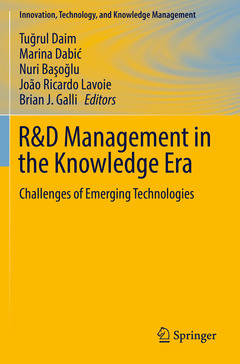R&D Management in the Knowledge Era, 1st ed. 2019 Challenges of Emerging Technologies Innovation, Technology, and Knowledge Management Series
Coordonnateurs : Daim Tuğrul, Dabić Marina, Başoğlu Nuri, Lavoie João Ricardo, Galli Brian J.

This volume explores emerging models, methods and tools in the management of research and development (R&D) in the knowledge era, with a particular focus on the challenges of the emerging technologies. The contributions are organized in five parts. Part I, Managing Emerging Technologies, provides methods and tools to understand the challenges created by the emergence of new technologies. Part II, Technology and Engineering Management Tools and Policies, explores different technology and engineering tools, including topics such as product concept development, design, selection and adoption, using technology roadmaps and bibliometrics. Part III, Technological Innovation and Entrepreneurship, explores R&D, knowledge transfer and entrepreneurial education. Part IV, Commercialization of Technological Innovations, explores the development and application of the technology transfer process which allows managers to succeed in commercializing the outcomes of R&D projects. Part V, Managing the Engineering Enterprise, explores the effect economic decision-making, leadership styles, change management and quality management have on an organization?s ability to plan and execute initiatives and projects.
Research and Development has always played a critical role in the engineering and technology focused industries. In an era of big data and smart applications, knowledge has become a key enabler for R&D. Managing R&D in the knowledge era requires use of key tools and methods. However, emerging technologies pose many challenges and cause uncertainties or discontinuities, which make the task of managing R&D even more difficult. This book will examine these challenges and provide tools and methods to overcome them.
Exploring such industries as automotive, healthcare, business intelligence, energy and home appliances, this book is a valuable resource for academics, scholars, professionals and leaders in innovation, R&D, technology, and engineering management.
Part I.- Chapter 1 Information Science and Technology – A New Paradigm in Military Medical Research.- Chapter 2 Technological Options for Enhancing ADU`s Sustainability: Solar PV and Insulation.- Chapter 3 Behind the Meter Energy Storage Implementation.- Chapter 4 The Adoption and Use of Tethered Electronic Personal Health Records for Health Management.- Chapter 5 A Practical Strategic Planning Approach for R&D Organizations.- Part II.- Chapter 6 Study on consumer requirements for Automotive Infotainment Systems.- Chapter 7 Creativity in Design Process using TRIZ: Application on Smart Kitchen Design.- Chapter 8 Additive Manufacturing (AM) Technology Assessment for Titanium Hip Implant Fabrication.- Chapter 9 An Evaluation Model of Business Intelligence for Enterprise Systems with Interval-Valued Intuitive Fuzzy ARAS.- Chapter 10 Appropriate Renewable Energy Sources for Electricity Generation: A Multi-Attribute Decision-Making Approach.- Chapter 11 Selection of Gamification Elements for Demand Side Energy Management an Application Using Hesitant Fuzzy AHP.- Part III.- Chapter 12 Country Wealth Influencing University Students’ Perceptions On Entrepreneurship Feasibility: A Survey.- Chapter 13 Entrepreneurial University: Faculty Previous Work Experience Predicting the Perceptions of Inadequate Link with Industry.- Chapter 14 First-Generation College Students and Satisfaction with Student-Success-Technology.- Chapter 15 Assessing the Key Factors Impacting the Adoption and Use of Tethered Electronic Personal Health Records for Health Management.- Chapter 16 Design Study of Medical Device .- Part IV.- Chapter 17 Technology Transfer: A Literature Review.- Chapter 18 Technology Transfer Assessment: An Integrated Approach.- Chapter 19 Evaluating Technology Transfer: Case of a Power Utility.- Chapter 20 Technology Licensing Performance and Strategy of US Research Institutions.- Part V.- Chapter 21 Implications of Economic Decision-Making to the Project Manager.- Chapter 22 Role & Impact of Leadership in Project Environments and How to Effectively Use Leadership in Project Environments.- Chapter 23 The True Pillars of Quality Management – How to View Them.- Chapter 24 Comparison of Change Management Models – Similarities, Differences and which is Most Effective.
Tuğrul Daim is a Professor and the Director of the Technology Management Doctoral Program in the Maseeh College of Engineering and Computer Science at Portland State University. He is also the Director of the Research Group on Infrastructure and Technology Management. He is a Faculty Fellow at the Institute for Sustainable Solutions.He is the Editor-in-Chief of IEEE Transactions on Engineering Management. He has been at various editorial roles in journals including International Journal of Innovation and Technology Management, Technological Forecasting and Social Change and Technology in Society.Prior to joining PSU, he had worked at Intel Corporation for over a decade in varying management roles. At Intel he managed product and technology development. During his tenure at PSU, he has acted as a Strategic Consultant to the Chief Technology Innovation Officer of Bonneville Power Administration a part of US Department of Energy. He helped develop regional and national technology roadmaps in the energy sector. He is a member of the R&D Advisory Board for TUPRAS, the largest industrial firm in Turkey. He received his BS in Mechanical Engineering from Bogazici University in Turkey, MS in Mechanical Engineering from Lehigh University in Pennsylvania, MS in Engineering Management from Portland State University, and PhD in Systems Science: Engineering Management from Portland State University in Portland Oregon.
Marina Dabić is a Professor of Entrepreneurship and International Business at the University of Zagreb, Croatia and Nottingham Business School-NTU, UK. Marina Dabić is the author of more than 200 articles and case studies, and has edited five books; the latest of which is a co-authored book entitled Entrepreneurial Universities in Innovation-Seeking Countries: Challenges and Opportunities which was published by Palgrave Macmillan in 2016. Her papers appear in wide variety of international journals, includ
Presents emerging methods, tools and policies in technology and engineering management
Features international cases studies from Croatia, Germany, Turkey, US, Canada and Saudi Arabia, among others
Explores technological entrepreneurship, entrepreneurship education and technology marketing
Features industries such as aerospace, energy and healthcare
Date de parution : 08-2020
Ouvrage de 624 p.
15.5x23.5 cm
Disponible chez l'éditeur (délai d'approvisionnement : 15 jours).
Prix indicatif 158,24 €
Ajouter au panierDate de parution : 07-2019
Ouvrage de 624 p.
15.5x23.5 cm
Disponible chez l'éditeur (délai d'approvisionnement : 15 jours).
Prix indicatif 158,24 €
Ajouter au panier


